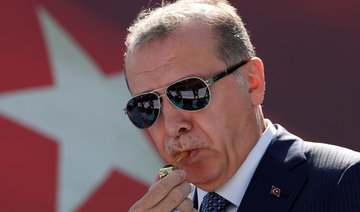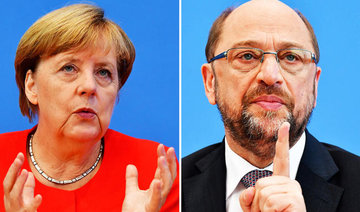ANKARA: Germany’s leading politicians were accused on Monday of exploiting growing tensions with Ankara for their own ends to bolster their vote in this month’s German general election.
Chancellor Angela Merkel of the Christian Democratic Union and her main rival Martin Schulz of the Social Democratic Party have vied with each other to see who can talk toughest on Turkey.
Schulz, an advocate of Turkish membership of the EU when he was president of the European Parliament, has now called for the immediate cancellation of membership talks with Ankara and freezing pre-accession funds that amount to about €4 billion ($4.68bn).
Merkel said she would discuss with other EU leaders whether it was possible to halt membership talks. “I don’t see Turkey ever joining and I never believed it would happen,” she said.
The Chancellor, who is ahead in the opinion polls before voting on Sept. 24, also hinted at economic sanctions. Germany is Turkey’s leading trade partner and largest export market, and also hosts the largest Turkish diaspora.
Turkish presidential spokesman Ibrahim Kalin said on Monday that German mainstream politics had “bowed to populism” in a way that was likely to trigger racism and discrimination.
Attacking Turkey and its President Recep Tayyip Erdogan “while ignoring the fundamental and urgent problems of Germany and Europe is a reflection of a narrowing vision in Europe,” he said.
Kalin accused Germany of “openly embracing” outlawed groups such as the Kurdistan Workers’ Party (PKK) and the Gulen organization. “Is Germany … aware that it is defending terrorists and coup plotters instead of defending democracy?” he said.
“We hope that this challenging atmosphere which has made Turkey-Germany relations the victim of a narrow political vision will change as soon as possible.”
Ankara restricted access for German politicians to visit German troops at the Incirlik airbase in southern Turkey, and has detained several German nationals. It accuses Berlin of harboring members of the Gulen network and the PKK, and denying extradition requests from Turkey.
Ozgehan Senyuva, head of European studies at Middle East Technical University in Ankara, said German politicians seemed to be using the divergence between Turkey and the EU for their own domestic political gains.
“I don’t consider these recent events as a break-up or turning point, but rather the continuation of the already existing rupture in Turkey-Germany and Turkey-EU relations,” he told Arab News.
Senyuva expects that the crisis will continue until the elections in Germany, as Turkey and its president are popular topics among German public. “Germany seems to opt for some sort of a neo-orientalism approach where Turkey is considered as one whole entity, ignoring the different voices and positions within.”
The key to the debate was who would make an effort to normalize relations, Senyuva said. “So far, the Turkish community in Germany, the most natural candidate, seems far from playing an intermediary role. They are being treated as subjects rather than actors in Turkish-German relations.”
Turkey’s Ministry of Foreign Affairs said on Monday that Turkey had a rich identity and future that could not be seen by short-sighted politicians, and that Ankara determined its own direction. “Such a populist approach will encourage xenophobia, racism and Islamophobia that are already expanding in Europe,” it said.
Gul Gunver Turan, president of the Turkey-EU Association in Istanbul, said that if German calls for a halt to Turkish EU membership talks were taken seriously by other EU members, it could antagonize those countries opposed to Germay’s domination of the EU, such as France.
“Turkish authorities deep down do not believe that they can conduct valid foreign policies without Europe. Turkey’s presidential spokesman Kalin’s statement urging that Turkish-German relations should not fall victim to this narrow political horizon is proof of that,” Turan told Arab News.
“Diplomacy is not an amateur's game,” she said, and she does not expect that Turkey’s membership talks with the EU will end, whatever the outcome of the general election in Germany.
Turkey takes center stage in German election battle
Turkey takes center stage in German election battle

Yemeni Prime Minister Ahmed bin Mubarak resigns

Ahmed Awad bin Mubarak, the prime minister of Yemen's internationally recognized government, said on Saturday he had submitted his resignation.
In a statement, Mubarak said he had faced "lots of difficulties", including being unable to reshuffle the government.
MSF says its hospital bombed in South Sudan
JUBA: Doctors Without Borders (MSF) said one of its hospitals in South Sudan had been bombed early on Saturday, leading to the loss of all its medical supplies.
“At 4 am today, MSF’s hospital in Old Fangak, South Sudan, was bombed. The pharmacy was destroyed. All medical supplies lost. There are reports of people killed and injured,” the medical charity said in a statement.
UN chief condemns Israeli strikes on Syria

- Antonio Guterres ‘alarmed’ over reports of sectarian violence around Damascus, Suwayda
- UN commission ‘deeply troubled’ after more than 100 people were killed in clashes this week
NEW YORK CITY: UN Secretary-General Antonio Guterres on Friday condemned repeated Israeli airstrikes on Syria as well as growing sectarian violence around Damascus and Suwayda.
The condemnation came after more than 100 people were killed in clashes in the Syrian Arab Republic over the past week.
The violence has taken place in two predominantly Druze suburbs of the capital, Jaramana and Ashrafiyat Sahnaya, as well as in the southern Druze stronghold of Suwayda.
Guterres “has been monitoring with alarm the reports of violence in the suburbs of Damascus and in the south of Syria, including reports of civilian casualties and assassination of local administration figures,” UN spokesperson Stephane Dujarric said on Friday.
The secretary-general condemned “all violence against civilians” and acts that “could risk inflaming sectarian tensions.”
Amid the sectarian clashes, Israel launched a series of airstrikes on Syrian targets, in what it described as an attempt to protect the country’s Druze minority.
Early on Friday, it bombed an area near the Presidential Palace in Damascus. Later that day, it targeted the Damascus, Hama and Daraa countryside, killing one civilian in the former and injuring four people in Hama, Syrian state news agency SANA reported.
Israel acknowledged the strikes, which it claimed targeted “a military site, anti-aircraft cannons and surface-to-air missile infrastructure.”
It followed a warning by Tel Aviv earlier this week that it would attack sites controlled by Syria’s new government if further sectarian clashes involving the Druze minority did not stop.
Guterres condemned Israel’s violation of Syria’s sovereignty and said it was “essential” that the attacks stop. He called on all parties to “cease all hostilities, exercise utmost restraint and avoid further escalation.”
Syria’s interim authorities under the government of President Ahmad Al-Sharaa must “transparently and openly” investigate all violations of peace in a bid to uphold their commitment to “dialogue and cooperation within the framework of national unity,” Guterres added.
On Friday, experts appointed by the UN Human Rights Council on the Commission of Inquiry on Syria described the surge in sectarian violence as “deeply troubling.”
The commission was established in 2011, and its three commissioners serve in an independent capacity.
“The spread of discriminatory incitement and hate speech, including through social media, is fueling violence and risks threating Syria’s fragile social cohesion,” the commission said on Friday. “While the situation remains fluid and an agreement has reportedly been reached between prominent leaders in Suwayda and the authorities in Damascus, the commission underscores that the interim government remains responsible for ensuring the protection of all civilians in areas under its control. Impunity for grave violations has in the past been a consistent driver of Syria’s conflict and must not be allowed to persist.”
The commission also highlighted the risk posed by Israeli airstrikes, as well as Tel Aviv’s continued expansion of its occupation in the Golan Heights.
Israel’s attempts to “divide various Syrian communities risks further destabilizing Syria,” it said.
“Syria’s recent history should serve as a reminder that external interventions have often led to increased violence, displacement and fragmentation.”
Sudan paramilitary drone strike hits border city near Eritrea: govt source

KHARTOUM: Sudanese paramilitaries have carried out a rare drone strike on the eastern city of Kassala, near the Eritrean border, a source from the rival army-aligned government said Saturday.
“A drone targeted the fuel storage area at Kassala airport,” the government source told AFP, blaming it on the paramilitary Rapid Support Forces and reporting no casualties or damage.
Gaza rescuers say three babies among 11 killed in Israel strike

- An overnight Israeli strike on the Khan Yunis refugee camp killed at least 11 people
- Israel resumed its military offensive in Gaza on March 18 after a two-month truce
GAZA CITY: Gaza’s civil defense agency said Saturday that an overnight Israeli strike on the Khan Yunis refugee camp killed at least 11 people including three babies up to a year old.
Civil defense spokesman Mahmud Bassal reported 11 killed “after the bombardment of the Al-Bayram family home in the Khan Yunis camp” in southern Gaza at around 3:00 am (0000 GMT).
Bassal told AFP that eight of the dead had been identified and were all from the same extended family, including a boy and girl, both one-year-olds, and a month-old baby.
Contacted by AFP, the Israeli military did not immediately comment on the strike.
Israel resumed its military offensive in Gaza on March 18 after a two-month truce in its war against Hamas that was triggered by the Palestinian militant group’s October 7, 2023 attack.
On Friday the civil defense agency said Israeli strikes killed at least 42 people across the war-ravaged territory, which has been under a total Israeli blockade since March 2.
Israel halted aid deliveries to Gaza, saying Hamas had diverted supplies. Israel says the blockade is meant to pressure the militants into releasing hostages held in the Palestinian territory.
UN agencies have urged Israel to lift restrictions, saying that Gazans were experiencing a humanitarian catastrophe and warning of famine.

















